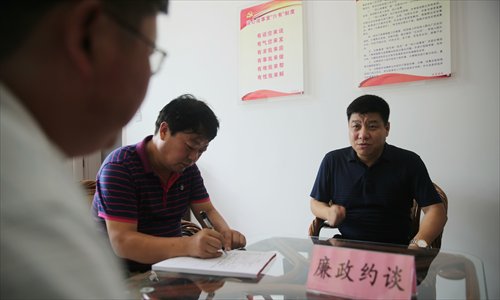Discipline watchdogs warn officials with face-to-face meetings

Discipline inspection officials of Baofeng county, Henan Province discuss disciplinary issues with a local official (left) on August 10, 2015. Photo: IC
"I didn't do that!" shouted Li Lijuan (pseudonym), a city-level official in North China's Shanxi Province who was interviewed over her alleged violations of Party discipline.
Sitting in front of a provincial-level official and her city's Party chief during the 30-minute interview last June, Li told the People's Daily that she felt shocked and confused by the tip-offs that landed her in hot water.
More and more discipline inspection watchdogs, at the local or central level, are adopting such "interviews" to fight corruption amid the three-year-old anti-graft drive, said experts.
Such interviews include those held to warn new officials about obeying the rules, as well as those held to investigate wrongdoing, Zhuang Deshui, deputy director of the anti-corruption research center at Peking University, told the Global Times Monday.
The practice of interviews has been used for discipline inspections for over a decade in a few cities including Hangzhou, East China's Zhejiang Province. But the approach was not used nationally until 2013, when Wang Qishan, China's top graft-buster, made it clear at a plenary meeting of the Central Commission for Discipline Inspection (CCDI) of the Communist Party of China (CPC) that all local discipline watchdogs need to start meeting officials in person.
China's discipline inspection departments met with about 32,000 people in 2014, Wang said in a speech in January 2015, the Xinhua News Agency reported.
Time to show loyalty
"When such interviews are conducted, especially when they are part of an investigation, it is a time for the interviewee to show his or her loyalty to the Party by telling the truth," said Fu Siming, a professor with the Party School of the CPC Central Committee.
He added that those who do not cooperate might face severe measures such as being put under shuanggui, literally, "double-designation," - the officials under investigation are asked to "explain themselves at designated time and designated place" - which is a CPC disciplinary measure that restricts personal freedom.
The interviews, usually conducted by a commission for discipline inspection, normally start with a notice saying when and where the meeting is being held, by whom and regarding what issues, said Zhuang.
He added that a written document recording the whole process will be signed by the interviewees at the end. The document normally ends with a question asking the interviewees whether they were hit, scolded, threatened, or insulted by the interviewers.
Normally interviews are conducted at the interviewee's office, while some are held in a special room at the discipline inspection department. A county-level discipline inspection official in Beijing told the Beijing Youth Daily that these rooms are padded and the windows are barred in case the interviewees try to hurt themselves.
Unexpected call
Li Lijuan, a standing committee member of a Shanxi city's CPC committee, was told to immediately return home for a talk when she was on a business trip to Beijing, the People's Daily reported in mid-April.
"I still remember it clearly, as it's the first time the Party had a talk with me not on my accomplishments or promotion, but for a 'negative warning,'" she said. Li was interviewed after tip-offs said she had stored a large amount of cash at her house and received bribes.
During the 30-minute interview, Li was challenged on the details of the tip-offs, and the inspectors asked her if there were any faults in her work that might spark public mistrust.
"I was sad all night and realized that I did receive some holiday gifts and money," said Li, who wrote a self-criticism letter that night.
In Shanxi, about 44 percent of the corruption clues involving provincial-level officials were investigated via interviews in 2015, the People's Daily reported. In 2014 only 1.6 percent of such cases involved interviews.
Zhou Jianshe (pseudonym), head of a provincial-level department in Shanxi, at first did not confess the actual amount of money he had received and claimed he was the victim of revenge when he was first interviewed in early 2015, the People's Daily reported.
"I have many concerns, such as how to build public trust after admitting that I received bribes," Zhou said.
However, when he was interviewed again and told that officials who lie to the authorities will face harsher punishment, he finally confessed.
Newspaper headline: Corruption chat